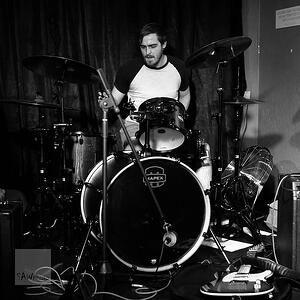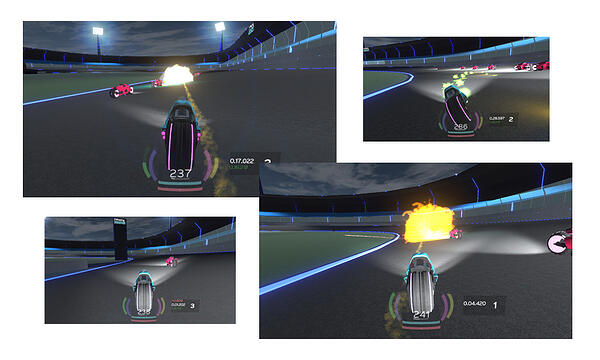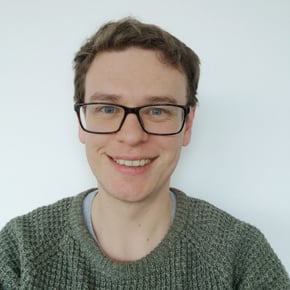Tell us a little about your journey into music production, how you first got it making music and what led to where you are now?
My journey into the world of music production probably started where most people start; from playing music. I always loved performing and wanted to somehow create recordings of the music that I loved. My dad bought me a second hand Edirol UA-25 USB interface 15 years ago off eBay, which I still use for all my audio needs to this day.
I downloaded Audacity and some freeware samplers for drum beats and my journey began. I originally started off recording some guitar bits of my favourite songs. Soon I wanted to add more instrumentation and my passion for sound engineering grew.
How did you find out about dBs Institute and why did you choose to study with us?
I found out about dBs Institute through some friends. It was either going to be graphic design or sound engineering by the time I left school and I chose the latter. I remember coming along to the open day and being super impressed by all the gear that was available and how approachable and friendly the staff were. It was clear everyone shared my passion for music and felt immediately comfortable. I knew it was the right choice for me.
You’re passionate about programming and audio, but I wanted to ask which one came first for you and how they both informed each other to lead to where you are now?
Audio certainly came first for me, but as I dove deeper into sound engineering as a topic it became clear that audio and programming can co-exist naturally. I started to get into electronic music more through my time at dBs and exposure to likeminded students and lecturers really made me want to explore the area further.
 I started programming drum beats, synthesisers, and always used heavy automation in my production. I started to get fascinated by lectures given on synthesis and sampling techniques, and just how far you can push the limits of your machine to produce interesting and unique sounds.
I started programming drum beats, synthesisers, and always used heavy automation in my production. I started to get fascinated by lectures given on synthesis and sampling techniques, and just how far you can push the limits of your machine to produce interesting and unique sounds.
It wasn’t until university the distinction between programming and audio was made. On a couple modules we used C and C++ to create versatile audio plugins that we could use with our preferred digital audio workstation. I created a multi-FX suite for guitars that could be used like a pedal. For another project I built a subtractive synthesiser at the height of dubsteps popularity! The synth never took off though...
You currently work as a software engineer, but use your spare time as a game developer, creating the combat racer ZXRacing. Was that project all you in terms of design, programming, audio etc.?
Yes, everything that is in ZXRacing is of my own design. It has been a steep learning curve! I’m using Unity and Blender which are free pieces of software on this project, mainly because I can’t afford the price tag that comes with industry standard software!
Computer games are interesting projects as they combine the creative aspect of designing artwork, creating 3D models, and making things look nice, with the logic aspect of allocating a system’s resources, applying physics to objects, generating AI algorithms and making things... work! It really makes you appreciate all the effort that goes into games, as you can spend days on the finer details. I was never much of an artist so it definitely pushes me out of my comfort zone.

Sound effect creation is especially fun, you have to really think outside of the box to make 10 different explosions sound unique. Everything I learned at dBs in regards to sampling has been incredibly useful here. I’ve been researching a lot into what makes an engine sound the way it does to give an added sense of realism to the bikes. Of course there are so many different noises an engine can make, and they all pitch with engine revs at different frequencies. It’s been challenging to incorporate all of these noises to make a realistic living, breathing vehicle.
You’ve also built three electric guitars, one of which had some incredible features thanks to an integrated Raspberry Pi. Could you tell us a little more about that?
So for my second guitar built I wanted to build something a little special. The idea was to have a Raspberry Pi integrated into the guitar complete with it’s own rechargeable battery and touch screen display. The output from the guitar would feed into the Raspberry Pi through a specially made audio interface or ‘HAT’.
-1.jpg?width=600&name=Josh%20Lyell%20DIY%20Guitar%20(1)-1.jpg)
The signal was then sent to a piece of open source software called PureData to process the audio. On PureData I built a program that would live record the audio, loop it, pitch it, cut it up etc and spit it back out through a stereo jack.
The program also had melody generators, drum machines, basic MIDI functionality; the idea was to create a ‘band in a box’.
-3.jpg?width=300&name=Josh%20Lyell%20DIY%20Guitar%20(2)-3.jpg) The concept was there, the guitar functioned as normal, and the program recorded audio and everything worked...Just one fatal flaw: electric guitar pickups work by using electromagnets. It also turns out computers emit electromagnetic interference rendering the project almost useless!
The concept was there, the guitar functioned as normal, and the program recorded audio and everything worked...Just one fatal flaw: electric guitar pickups work by using electromagnets. It also turns out computers emit electromagnetic interference rendering the project almost useless!
Despite the overkill interference from the Raspberry Pi, the computer and guitar could be used separately, but not together. It was an interesting project, one I learned a lot from. It became a useful prototyping board for my third guitar!
As someone who has such a diverse skill set how do you stay focused on projects? I can imagine there’s an unending stream of ideas that could distract you.
There certainly is an unending stream of ideas! I usually do a lot of research before I start something, just to see if it is feasible, and within my skill level. If I am not challenged or find something too hard I tend to get bored so I try and tackle something new and interesting. I like to try and build things that are useful to me or other people in some way. Money is certainly not a motivator, but it is always exciting to think something you randomly dream up could make you money some day!
How did your time at dBs help push you creatively?
dBs was an incredible source of creativity, there was always a strong sense of community between the teaching staff and students. We were all actively engaged in each others projects, interested in each others ideas, and creations and ways of thinking. It really helped cultivate a positive learning environment, and just seeing what you can make of something, while having a great ton of fun.
Having access to a wealth of different gear and being encouraged to ‘just have a go’ makes all the difference. Being in a space with musicians, DJs, producers from all walks of life, who all have different ideas for everything can really challenge your understanding and open your eyes to new experiences.
Based on your experience since leaving education what advice would you give to someone about finding work in the industry and also balancing work with your other interests?
Be patient! It can be difficult finding the right career path after graduating, I found it difficult as I couldn’t really decide what it was I wanted to do. I ended up trying a lot of different types of roles before I settled. I tried odd freelance jobs in live sound engineering, session musician work, studio production and even composition before I settled on software engineering. Don’t be afraid to try something new and step out of your comfort zone.
Also always ask questions, learn from other people’s experiences as well as your own.
What’s next in the pipeline for you?
Currently I’m a software engineer for a small software tech startup, but I have big plans outside my regular day job! I tend to dip in and out of freelance web development projects all the time, but will be excited to see where ZXRacing takes me as it nears completion. My own game studio perhaps?!
FIND OUT MORE
Bubblehead


.jpg?width=300&name=Josh%20Lyell%20(Featured%20Image).jpg)